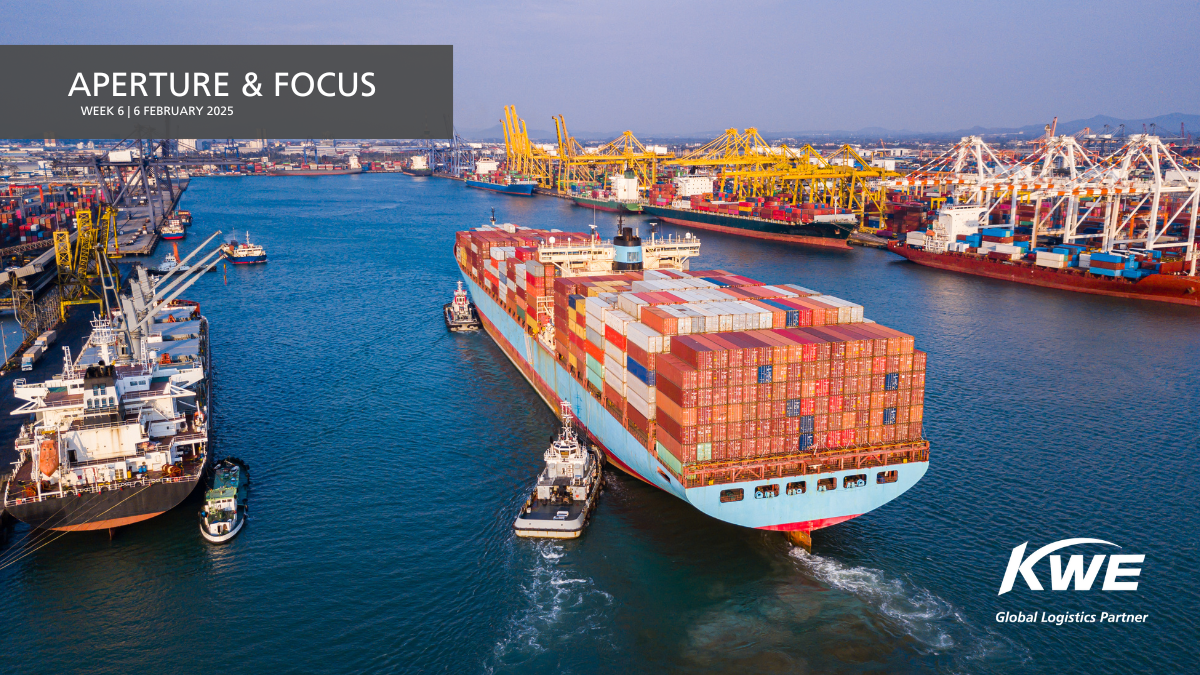Quote
Aperture & Focus 2025: Week 6

Global Aperture
Global air cargo demand grew just 2% in January, falling short of analysts' expectations after last year's double-digit gains. Despite trade uncertainties, the 2025 growth forecast of 4-6% remains unchanged. The U.S. has already suspended the de minimis exemption for all Chinese shipments, which previously allowed goods under $800 to enter duty-free with minimal customs processing. Now, these shipments must go through full customs clearance, causing major delays in China-U.S. e-commerce and impacting delivery times more than costs.
Container carriers have been preparing for a slowdown in the transpacific trade in February, with capacity forecasted to decrease to 1,220,000 TEU due to factors like delayed arrivals, blank sailings for Lunar New Year, and changes in alliance services. These capacity reductions are part of a broader trend of service adjustments and reshuffles within the industry.
Following pressure from the United States, Panama has decided not to renew its Belt and Road Initiative deal with China and will grant toll-free transits to US Navy vessels through the Panama Canal. The administration has also said it is considering review of a 25-year concession with Hong Kong-based Hutchison Port Holdings due to U.S. concerns over alleged links to the Chinese government.
Regional Focus
Americas
United States: Citing national security concerns, the White House issued executive orders imposing a 25% tariff on imports from Canada and Mexico and a 10% tariff on imports from China on February 1st. These tariffs were scheduled to take effect on February 4th. However, after negotiations, the U.S. government agreed to delay the implementation of the tariffs on Canada and Mexico by 30 days to allow for further discussions.
As part of these trade measures, the U.S. has also suspended the de minimis exemption on imports from China. As mentioned above, this exemption previously allowed goods under $800 to enter duty-free with minimal customs processing. This change is expected to increase costs and cause longer processing times for e-commerce shipments, most of which arrive by air. As a result, airfreight demand could decline, shifting cargo to ocean freight and increasing reliance on U.S. warehousing and distribution networks.
In response to the U.S. tariffs, China announced retaliatory tariffs on American goods that are scheduled to take effect on February 10th, including a 15% tariff on U.S. coal and liquefied natural gas and a 10% tariff on crude oil and agricultural machinery.
Asia-Pacific
Southeast Asia’s booming manufacturing and export sectors are driving strong air cargo demand, particularly in electronics, garments, and smartphones. Vietnam saw a 14.3% rise in exports in 2024, generating $405.5 billion in revenue. However, concerns are growing that this rapid expansion could trigger U.S. tariffs, given Vietnam’s increasing trade surplus with the United States.
India: In a bid to ease growing trade tensions with the U.S., India has significantly reduced import duties on luxury motorcycles, cars, and lithium-ion batteries. However, Indian export industry stakeholders caution that broader issues, such as market access and intellectual property rights, remain unresolved.
Singapore: The Gemini Cooperation, a new ocean network from Maersk and Hapag-Lloyd, has been launched with Singapore as a central hub for Europe-Asia cargo. This partnership aims to achieve over 90% schedule reliability and will operate 340 vessels with a combined capacity of 3.7 million TEUs.
Europe, Middle East & Africa
France: Dockers and port worker unions at France’s major ports, including Le Havre and Marseille, continue intermittent industrial action in protest of state pension reform. Following strikes in late January, including a 48-hour national stoppage on January 30th and 31st, multiple walkouts have been planned throughout February. The disruptions have impacted freight schedules, raising concerns of financial losses, congestion, and potential cargo diversions to other northern European ports.
South Africa: Durban’s Pier 2, South Africa’s main container gateway, remains plagued by congestion, despite the promise of considerable investment by Filipino port operator ICTSI in return for a 25-year operating license. However, a legal challenge over ICTSI’s solvency ratio has stalled the project, casting doubt on the project's timeline and execution.